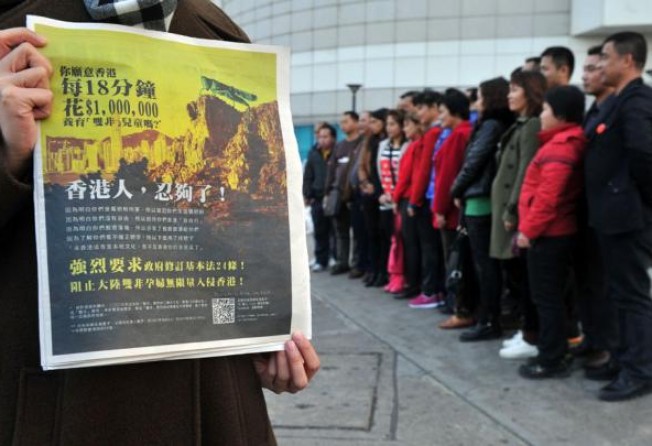Welcome back … to a town torn by anti-mainland anger
It turns out the fury vented at Beijing is not against national education but a sense that the city is no longer in control of its own destiny

I have been away from Hong Kong for a year. Yes, I have read about the growing resentment against mainlanders. But I never expected a welcome home party on Stanley beach to turn into a complaint forum.
At the party are my girls' classmates and their parents. This is a group that you would least expect anger from.
George is typical of them. He is a self-taught certified accountant. He is no hot head.
He runs his own accountancy firm that employs 50 people. He doesn't have to worry about losing his job or business to highly competitive mainlanders.
George is a beneficiary of the mainland's booming economy. Business is good enough to allow him to pick up his son every day from school at 3pm. The value of his handful of apartments has more than doubled in the past few years.
His wife stays home to take care of their single child. Rising food bills and rents fuelled by mainlanders' buying sprees are not their concern.
They don't have to compete with mainlanders for hospitals beds or milk formula. Their seven-year-old is studying in a local school.
These people have little economic reason to dislike the mainlanders. Yet they call the mainlanders qiang guo ren, which is literally translated as "people of the strong country" for their pushiness (mentally and physically).
They call Tsim Sha Tsui "the invaded zone". They miss the good old days when they could stroll with their kids at Ocean Park without having to fight the queue jumpers.
They complain of corner-cutting in the work place and being told that "this is the way it is in the mainland".
They said they would leave the city for good if the subject of "national education" was forced on their kids. "China kills its own people," said one of the dads.
Basking in the sun while the children built sand castles, they warned of the eventual "fall" of Hong Kong. "Why didn't you stay in Britain?" asked one mother.
It must be the frustration over the national education thing, I told myself, trying to make sense of their sentiment.
I was wrong. On October 1 we gathered again, this time for the fireworks. "Toast to the moon, not to the National Day," said one of the fathers. "Well said," was the echo. That was two weeks after the government shelved the plan for the curriculum.
If this is what the "winners" of the system are saying, it isn't surprising to see a best-selling political commentary, the Hong Kong Polis, equating the integration of Hong Kong and the mainland to a dirty old man trying to fool his little granddaughter into bed.
Its author, Chin Wan, advocates autonomy for Hong Kong and restoration of the lion and dragon colonial flag. He says Beijing will not retaliate because it needs "a city of integrity" to deal with the world.
Most of my English-speaking colleagues found this pique difficult to understand. If the French could tolerate the noisy Americans and now the noisy Chinese on the Champs-Élysées, why can't the Hongkongers put up with the crowds of mainlanders?
The quick answer is the Americans and Chinese don't have a say over France's political, social and economic matters. The longer answer is in our history.
In the colonial days, Hong Kong was so cut off from the mainland that a policeman needed approval to cross the Lo Wu Bridge. The Tiananmen massacre and the country's backwardness was the first glimpse of China for most of us.
We were then thrown into the hands of a total stranger. That's fine because the stranger was the one in need. We poured in our money and knowhow.
By late 1990s, the country was rich enough to hire our regulators and managers for their "international edge". Yet, most of them were soon sent home because "they don't understand the country".
It hurt a bit, but not too much. The majority saw this as a conflict between our civilised rules and their uncivilised one, not a denial of our values.
Then in 2003, we suddenly found ourselves becoming the needy, begging for the surgical masks, stock issuers and tourists from the "uncivilised relatives". That hurt.
If it's for a better life, the pride can be swallowed. Yet, the better life has not come. The have-nots struggle to pay rising bills while the haves see a worsening living environment.
Many have warned Hongkonger's against this ill-feeling against the mainland, with some calling it an independence move. They say Beijing will not cut off the water supply, but what chance would Hong Kong have without Beijing's trust.
These warnings, however well-intended, have missed the crux of the resentment. To these bitter citizens, what is the point of keeping quiet in the hope of a prosperous Hong Kong if it is no longer owned and shared by Hongkongers.
- This is Shirley Yam's first column since her recent return to Hong Kong after a year in Britain.